The Biden administration's use of the Federal Trade Commission to break up monopolies— suing Amazon, for example, on September 26—resurrects the nation’s traditional antitrust vision. By trying to weaken the economic power of large entities in order to restore competition, innovation, and the rights of workers and consumers, Biden officials are echoing the principles articulated by politicians of all political stripes in the early twentieth century. Those principles were in full flood during the presidential election that took place on November 5, 1912. The progressive impulse grew in response to the rise of the business trusts that grew to control the economy in the 1880s, gathered steam in the 1890s as muckrakers like those writing for McClure’s Magazine explained in detail how a few well-connected men ran business and government in their own interests, and grew stronger as at least 303 firms disappeared in mergers every year between 1898 and 1902. The idea of restoring competition gained a champion in the White House in 1901 when Republican Theodore Roosevelt stepped into the office of the slain big-business defender William McKinley.
Theodore Roosevelt WikiQuote But Roosevelt quickly found that progressives had little luck passing bills to regulate business and protect ordinary Americans. (Alan: And it is God's Truth that the reason Teddy had little luck passing bills was - and is - that too many members of Congress are ensconced in the dark place malevolent magnates, and suck any-and-every legislative filth from the teat of Big Business. These legislators have sold their souls to Big Business because they are habituates to the payoff of power, and a life of luxury.) House speaker Joseph G. “Uncle Joe” Cannon, a key member of the so-called Republican Old Guard who supported big business and ran the House with an iron fist, stood in the way. Roosevelt turned to litigation and executive orders to break up trusts and protect lands from industrial development. Theodore Roosevelt When Roosevelt stepped aside in 1908 for his hand-picked successor, Willam Howard Taft, he warned the nation in his last message that the new conditions of industry had enabled corporations to become a “menace” and required that government regulate them to protect economic competition in general and workers in particular. Theodore Roosevelt WikiQuote Roosevelt tried to stay out of Taft’s way by traveling to Africa to hunt big game (prompting banker J. P. Morgan to cheer on Roosevelt’s demise with his famous quip, “Let every lion do his duty”), leaving Cannon free to go on the attack. In February 1910 he gave a widely reprinted speech that called anyone supporting government regulation of business and protection of workers a wild-eyed radical.  But momentum for economic reform was gathering speed. Back in the U.S. a few months later, Roosevelt countered that if this were the case, President Abraham Lincoln was “a great radical…. To-day,” Roosevelt said, “many well-meaning men who have permitted themselves to fossilize, to become mere ultra-conservative reactionaries, to reject and oppose all progress, but who still pay a conventional and perfunctory homage to Lincoln’s memory, will do well to remember exactly what it was for which this great conservative leader of radicalism actually stood.” Theodore Roosevelt WikiQuote Lincoln, Roosevelt said later that year in Osawatomie, Kansas, had stood against the special interests that had perverted government to their own ends and robbed hard workers of what they had earned. In Lincoln’s day the threat came from the Slave Power; in 1910 it came from business interests. The nation was currently governed by “a small class of enormously wealthy and economically powerful men, whose chief object is to hold and increase their power.” Compendium Of Best "Pax" Posts On The Cornerstone Necessity Of EducationTheodore Roosevelt WikiQuote Roosevelt demanded that the government restore an even economic playing field in the country, forcing businesses to operate transparently, submit to regulation, and stop funding political campaigns. He also called for graduated income taxes, inheritance taxes, the protection of national resources so industrialists could not strip them all from future generations, minimum wages, maximum hours of work, and better factory conditions. The History Of Corporations: The Founding Fathers, Ronald Reagan And Elizabeth Warren Converge On Stakeholder Capitalism - "Get Back To Where You Once Belonged, America!"Theodore Roosevelt WikiQuote Roosevelt was echoing the language that Democrats had embraced since 1884, when Grover Cleveland, whose base was in the urban areas of New York, won the White House. That message was not limited to politicians; indeed, it came from ordinary Americans of all stripes, including women, who could not vote but who had begun to exercise their power as consumers. They were more and more vocal, demanding an end to milk adulterated with chalk and formaldehyde, streets running with industrial pollution, and factories that overworked and maimed husbands and children. Roosevelt added a Republican endorsement to that impulse, and momentum built. In 1910, voters gave control of the House to the Democrats, who backed an investigation into the power of bankers to direct the economy. In 1912 the House Committee on Banking and Currency under Arsène Pujo (D-LA) began to investigate the growing concentration of wealth in the economy. Theodore Roosevelt WikiQuote Four major parties fielded presidential candidates in the election of 1912; all were progressives. The Republicans renominated President Taft, who during his first term had broken up more trusts even than Roosevelt had. Taft’s nomination prompted Roosevelt to run on a third-party Progressive ticket, where he warned Americans that the government had sold out to business and that “[we] stand at Armageddon, and we battle for the Lord.” The Democrats nominated former college president and New Jersey governor Woodrow Wilson, whose advisor, the jurist Louis Brandeis, called for restoring competition to the economy to protect the welfare of all the people. The American Socialist Party also fielded a candidate, Eugene V. Debs, who called for an ultimate end to capitalism and for workers to seize control of the government. Theodore Roosevelt WikiQuote On November 5, 1912, voters elected Democrat Woodrow Wilson to the White House and gave the Democrats control of both chambers of Congress. Although he won only 42% of the popular vote, Wilson garnered 409 electoral votes to Roosvelt’s 107 and Taft’s 15. In an even more pointed message, the split in the Republican Party also led to the ouster of Uncle Joe Cannon from Congress.
Theodore Roosevelt WikiQuote In February 1913, a month before Wilson took office, the report of the Pujo Committee—so called even though an illness in Pujo’s family made him cede the chair to Hubert Stephens (D-MS)—showed that overlapping directorates and corporate boards had enabled a handful of men to control more than $22 billion in 112 corporations, where they stifled competition. Alan: "The Big Burn: Teddy Roosevelt And The Fire That Saved America" is "in the running" for "Best Book I've Ever Read." Theodore Roosevelt Although banks refused to cooperate with the investigation, the committee had learned enough to be “satisfied from the proofs submitted, even in the absence of data from the banks, that there is an established and well-defined identity and community of interest between a few leaders of finance, created and held together through stock ownership, interlocking directorates, partnership and joint account transactions, and other forms of domination of banks, trust companies, railroads, and public-service and industrial corporations, which has resulted in great and rapidly growing concentration of the control of money in the hands of these few men.” Outraged, Americans got behind the Sixteenth Amendment to the Constitution establishing the power of the federal government to levy an income tax, which was ratified in February 1913. In December 1913, Congress passed the Federal Reserve Act, providing federal oversight of the country’s banking system. The following year it passed the Clayton Antitrust Act, which prohibited anticompetitive economic practices. And it established the Federal Trade Commission to prevent unfair methods of competition. Theodore Roosevelt WikiQuote November 5, 1912, turned out to be a crucial day in the history of our country. But when the day dawned, it was not clear what the evening would bring. For their part, Mr. and Mrs. J. H. Kyler of Denison, Texas, were hedging their bets: when their newborn triplets arrived shortly before the election, they named the boys William Howard Taft Kyler, Theodore Roosevelt Kyler, and Woodrow Wilson Kyler. Theodore Roosevelt WikiQuote Notes: The internet tells me that T.R. Kyler and W.H.T. Kyler both died at 7 months. W.W. Kyler lived to be 90. https://info. https://www. Theodore Roosevelt WikiQuote https://www.ftc.gov/sites/ https://www.cnbc.com/2023/10/ Theodore Roosevelt, Eighth Annual Message, December 8, 1908, at https://www.presidency.ucsb. Theodore Roosevelt WikiQuote Theodore Roosevelt, Foes of Our Own House (New York: George H. Doran, 1917), p. 92. Cannon: New York Times, November 5, 1912, p. 1. Kyler triplets: New York Times, November 5, 1912, p. 1. The Insuperable Stupidity-Perversity-Ignorance Of Diehard Trump SupportersTheodore Roosevelt WikiQuote Alan: Here is an alteration of TR's famous comment about "carrying a big stick." This altered rendition typifies the scaredy cat conservative believe that protection is to be had - and refractory solutions can be worked - only by the application of ever more force. Notably, the "United" States spends more on so-called "defense" than the next ten countries combined. https://www.pgpf.org/chart-archive/0053_defense-comparison Theodore Roosevelt WikiQuote You’re currently a free subscriber to Letters from an American. If you need help receiving Letters, changing your email address, or unsubscribing, please visit our Support FAQ. You can also submit a help request directly. For the full experience, upgrade your subscription. |
Monday, November 6, 2023
Heather Cox Richardson's "Letters From An American" Probes The Motivation Behind Republican President Teddy Roosevelt's Full-Throttle Commitment To Progressivism
Theodore Roosevelt
WikiQuote
"Too much cannot be said against the men of wealth who sacrifice everything to getting wealth. There is not in the world a more ignoble character than the mere money-getting American, insensible to every duty, regardless of every principle, bent only on amassing a fortune, and putting his fortune only to the basest uses —whether these uses be to speculate in stocks and wreck railroads himself, or to allow his son to lead a life of foolish and expensive idleness and gross debauchery, or to purchase some scoundrel of high social position, foreign or native, for his daughter. Such a man is only the more dangerous if he occasionally does some deed like founding a college or endowing a church, which makes those good people who are also foolish forget his real iniquity. These men are equally careless of the working men, whom they oppress, and of the State, whose existence they imperil. There are not very many of them, but there is a very great number of men who approach more or less closely to the type, and, just in so far as they do so approach, they are curses to the country."
(Forum, February 1895.) Mem.Ed. XV, 10; Nat. Ed. XIII, 9.
Republican President Teddy Roosevelt
Spearhead Of Progressive Politics
Wikiquote
Teddy Roosevelt On "Malefactors Of Great Wealth"
Subscribe to:
Post Comments (Atom)
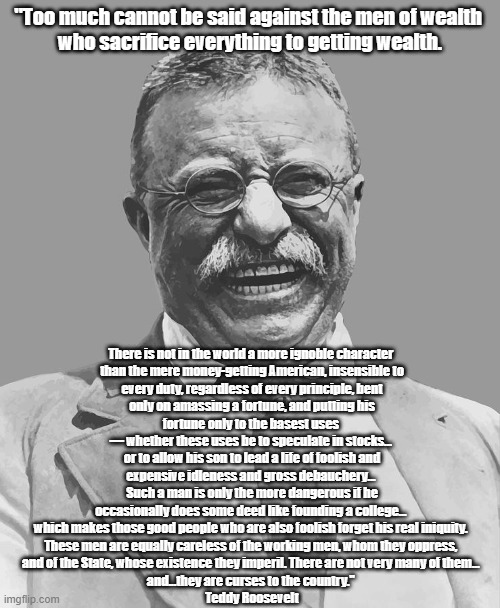

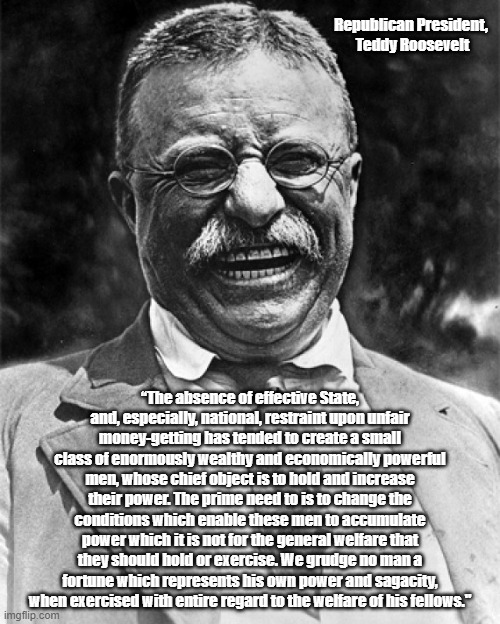


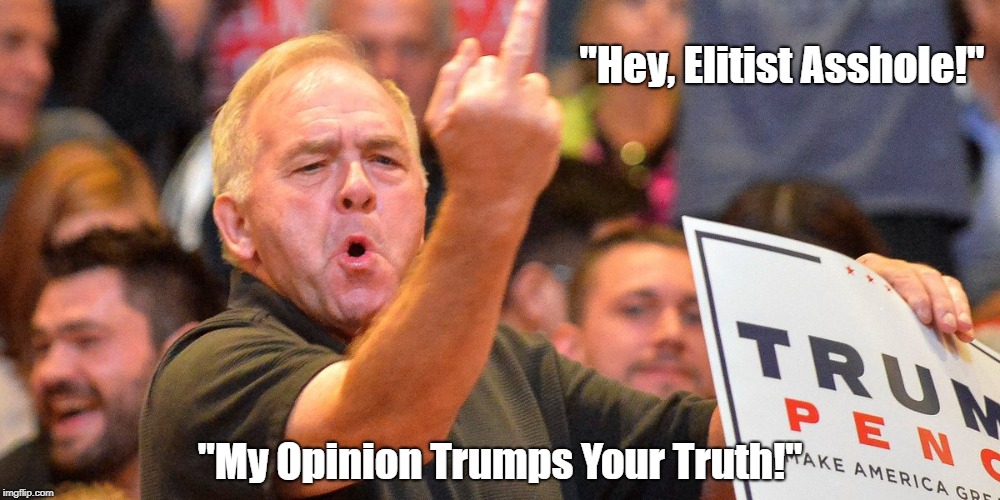
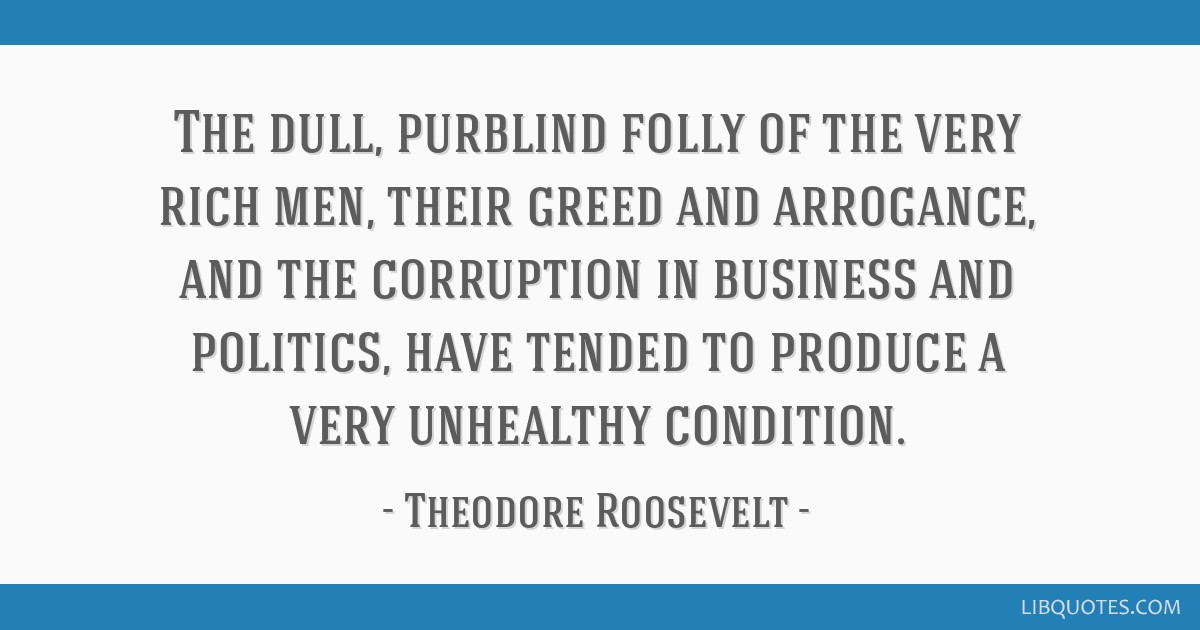

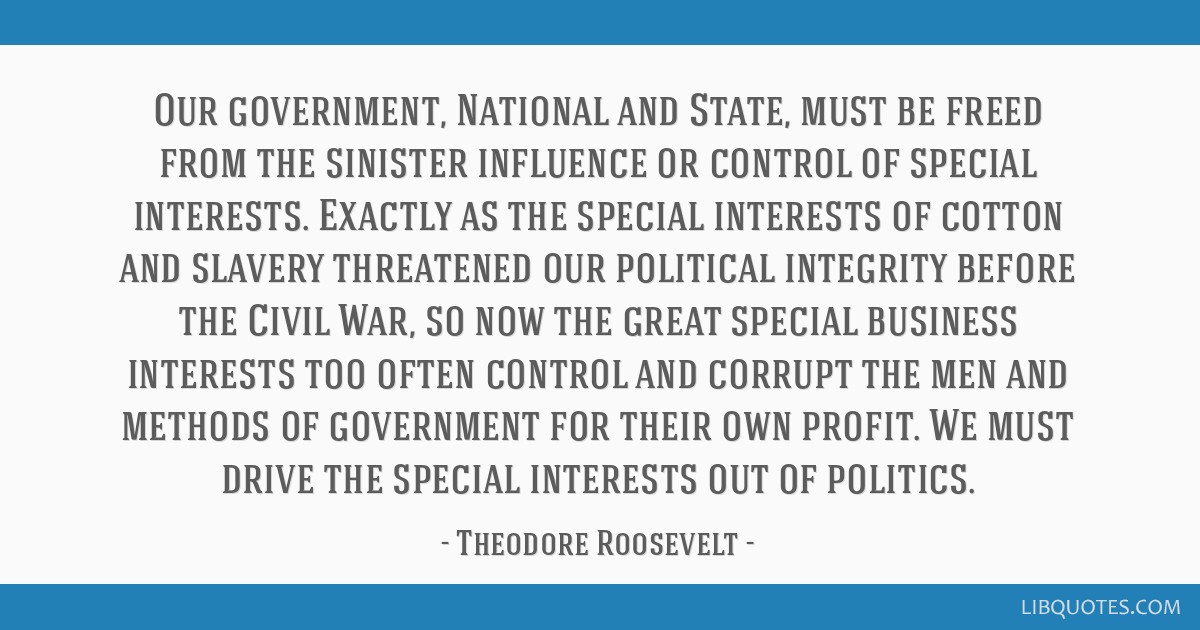

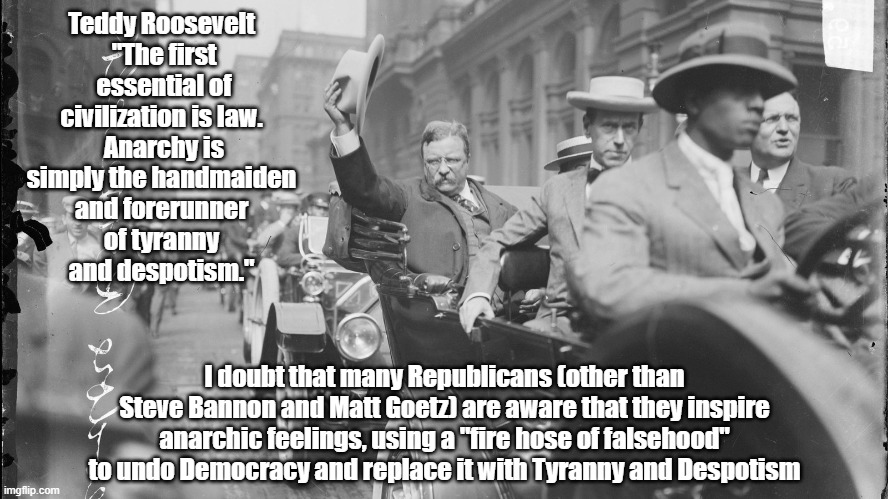
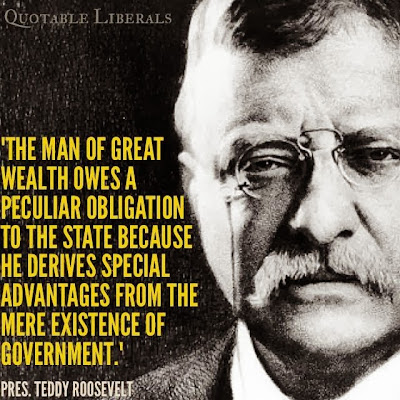

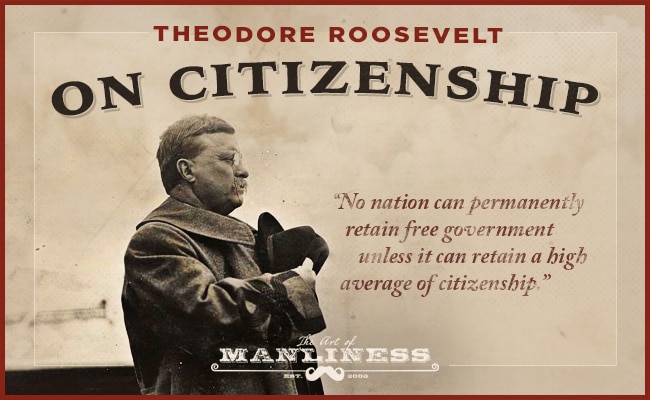
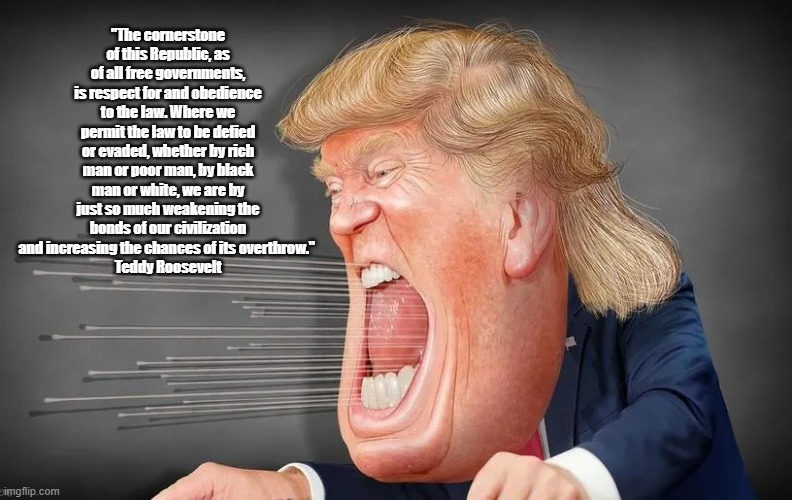


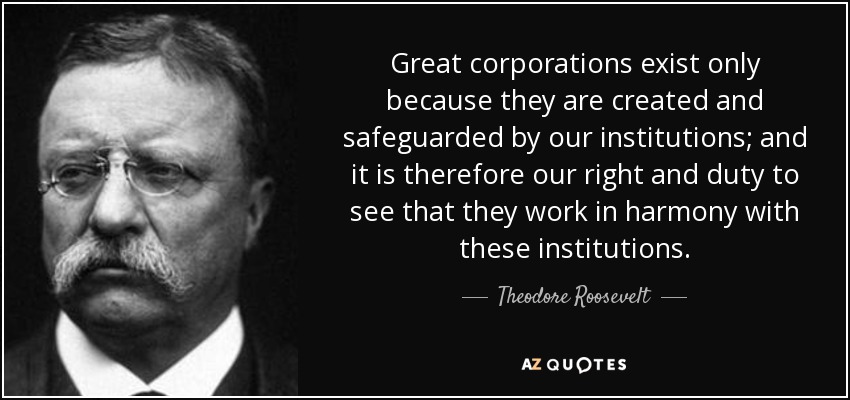

No comments:
Post a Comment